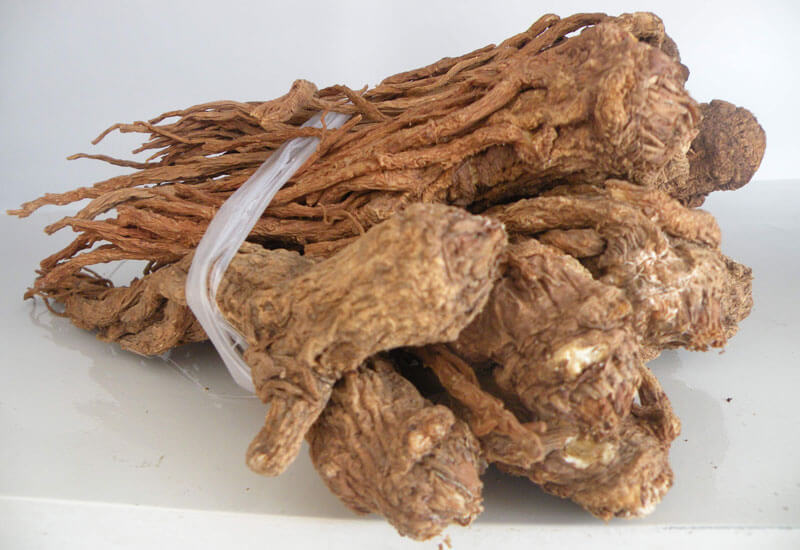Botanical to Angelic- Dong Quai to harmonize the natural cycle
Angelica species grow as perennial herbaceous plants. They form a short "rootstock", which has residues of the leaves in the upper region. The striped stem is dichotomously branched in the upper region. The leaves arranged alternately on the stem are divided into leaves, leaf stalk and leaf blade.
Typical fields of application are menstrual and menopausal complaints, such as irregular menses, convulsions, mood swings, migraine, hot flashes, fatigue and lack of energy. After scientific studies showed that Angelica Sinensis contains Phyto-estrogens, the application of the root has also established itself in the western naturopathy.
Healing rootstock that helps with menstrual problems, migraine and stomach pain
The angelic curse was once regarded as a remedy for plague and witchcraft. Today, the rootstock is used for medicines against gastrointestinal discomfort or loss of appetite. In addition to numerous healing functions, however, it also has side effects.
The Dong Quai Extract can grow up to two meters in height and belongs to the family of the umbelliferous. The roots and the fruits are used in this herbal medicine. The angelic spleen has a digestive and appetizing effect. The components of the angelic sprout are used for the treatment of digestive disorders, stomach pain, menstrual problems, migraine, colds, etc.
The roots and fruits are mainly used for internal use. As a tea or wine tincture (wine with root), the angelic spleen acts against digestion problems and appetite deficits. The root contains an essential oil. For this to have its effect, the tea or the wine tincture should be drunk or taken before meals. The fruits are cooked to tea and then act with menstruation complaints. It is important, however, that the components of the angelic sprout are only used in small amounts, since otherwise side effects such as depression can show-up.
Engelwurz is also included in various finished products for the treatment of gastrointestinal complaints. Since the active ingredients of the angelic sprout lead to an increased sensitivity to light of the skin, intensive sun radiation should be dispensed with when taking preparations in which this plant is contained.
What are the ingredients? What does the medicinal plant help?
Dong Quai Extracts cause more stomach acid due to their bitter taste. Also bile acids and enzymes of the pancreas are distributed more and more. As a result, the plant stimulates the appetite and brings digestion to a close. A further effect: Angelic wreath has a great effect. The so-called furanocoumarins are probably responsible for this effect. These secondary plant substances are meant to block calcium channels that are located on the smooth muscle of the gastrointestinal tract, thereby relaxing them.
Dong Quai Extract, therefore, helps as a herbal remedy for ailments such as loss of appetite, bloating and cramps. For this purpose the herb is often combined with other medicinal plants, such as caraway or peppermint. Since the angelic sprain can also resolve convulsions, preparations from the root can also be used - in consultation with the treating physician - for irritable bowel syndrome.
Angelica root, also called angelic spur, counteracts flatulence and bloating
An angel is said to have sent her to the earth as a remedy in times of great distress. A pious man found them and used them as a remedy against the plague. The speech is from Engelwurz - also called Angelikawurzel - whose name is derived from this legend.
Since their home (among others) is the high north, northern men especially knew the Angelica archangelica as a medicinal and vegetable plant. The Vikings brought the greenhouse in the 10th century as commercial goods to Central Europe. There it was soon planted in monastic gardens, and later, as a cure-all, by Paracelsus.
Although dong quai is low in toxicity and generally well tolerated, ingestion may cause diarrhea and stomach upset in sensitive individuals. For this reason, Dong quai root is often contained in herbal compositions (especially for menopausal time or for menstrual problems) but is rarely offered separately in the West. In Asia, however, the root is also eaten raw and is available as tea, capsule, tablet or tincture.



 Healthier Future
Healthier Future